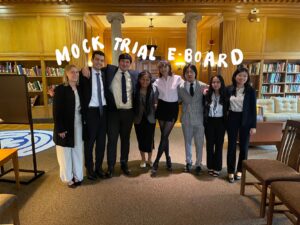Calling everyone who enjoys theater, trials, and everything in between – Mock Trial sounds like the perfect opportunity for you! Mock Trial allows students to act as witnesses or attorneys to prove their side of the case. The University’s Mock Trial team competes at tournaments year-round across the country.
During the Activities Fair last year, I first learned about Mock Trial. As a political science major on the pre-law track, Mock Trial sounded like a great way for me to learn more about the courtroom in practice. When I found out that there were tryouts, I felt anxious. The tryout was one of the first performances I gave in college, and I wanted to ace it! As someone who tried out as an attorney, I had to cross-examine a witness and give a one-minute speech in front of the executive board. I remember shaking before and during the tryouts, but once the tryouts were over, I felt a sense of accomplishment. I had made it! One performance down, more to go.
Mock Trial competes all year round, but it is divided into two seasons: unstacked and stacked seasons. Unstacked season begins right after tryouts. All mockers (Mock Trial members) are split into different teams where each team develops their case theories to perform and prove in the trial. This season mainly focuses on new member education, introducing them to the basics of Mock Trial and case materials. New attorneys learn about objections from the Rules of Evidence, direct and cross-examinations, and opening and closing statements. New witnesses understand the importance of characterization and how their testimonies are crucial in enforcing their team’s case theories.
Unstacked season ends during the year’s first tournament, typically around mid-October. Then, based on everyone’s performance during the unstacked season, members are placed in new teams for the stacked season. If mockers decide that Mock Trial is not for them or don’t want to compete at a higher level, they can choose not to do the stacked season.
Unlike the unstacked season, stacked season is more rigorous and intense. Depending on which team a mocker is in, they compete in more tournaments. Last year, I was in the C team where I competed in two tournaments. It was a great experience since I didn’t feel pressured to compete at a higher level during my first year. I had a lot of time to learn objections, which is one of the hardest aspects of being an attorney. My team was supportive in helping everyone grow as either an attorney or a witness. However, midway through the stacked season, I had a change of heart and switched from being an attorney to a witness. It was a difficult decision to make since I was extremely passionate as an attorney, but I realized that my skill set was better off as a witness. Witnessing allowed me to use my creativity with how I present my character – I didn’t want to be limited by the formalities of being an attorney.
Before joining Mock Trial, I was worried that my lack of experience would put me at a disadvantage since a few members did Mock Trial in high school. I put myself under a lot of pressure to understand everything in Mock Trial and I realized that I had to take it easy. It was just my first year! Mock Trial is a competitive activity, but it’s also meant to be fun and enjoyable. So far, my favorite memory has been the internal scrimmages, or scrimmages with another team in the organization. Although these scrimmages are meant to be preparation for official tournaments, mockers are creative with their performance to the point that everyone in the room ends up laughing! I always enjoy seeing witnesses come up with clever one-liners to catch their crossing attorneys off guard.
I mentioned that our Mock Trial teams compete at different tournaments across the country, but we also host our own tournament in November! This year, I am the Yellowjacket Tournament Director, and I am in charge of hosting and organizing the 14th Annual Yellowjacket Tournament. As the tournament director, most of my work was done over the summer. I invited colleges across the country to compete, emailed members of the legal community to judge trials, and organized logistics within the university. Now, I am in the final stages of preparation before the official tournament in mid-November. I can’t wait to see schools from across the country come to the University of Rochester to compete!



